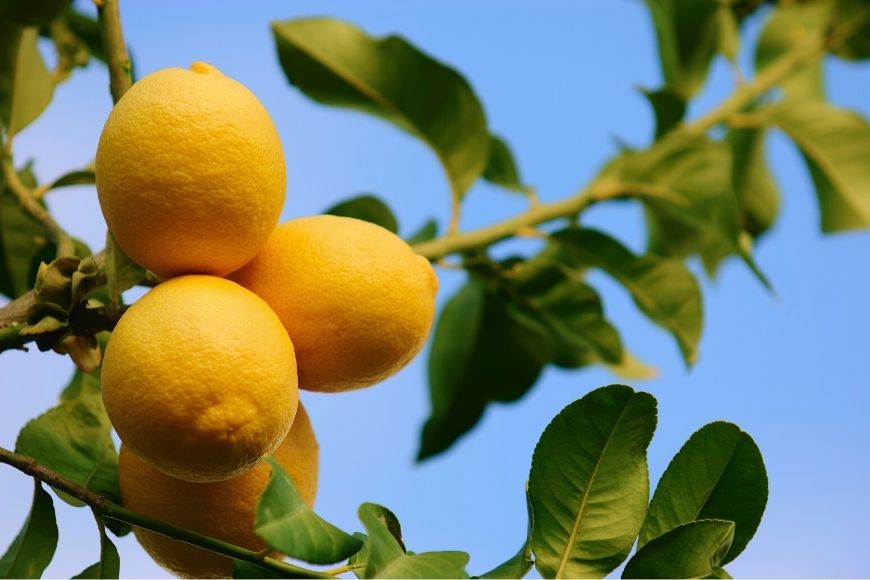
What could be better on a hot summer afternoon than an ice-cold glass of lemonade made from freshly squeezed lemons from your own tree?
If that puts a smile on your face, you can make it happen! As long as you have a little room in your yard, patio, deck, or apartment. Depending on the size of the tree that you start with, you can enjoy the deep green foliage, the beautiful blossoms, and the tangy fruit in a couple of short years.
To Pot or Not to Pot?
If you have plenty of yard space and you live in zones 9-11, you can plant yours outside!
If you don’t have the outdoor space and live in zones 9-11, you can put it in a pot, leave it outside, then bring it in when the temperature starts going down. Keep in mind that when growing outside you can grow a full-sized lemon tree – but in a pot, you will want to use a dwarf variety.
Varieties That Do Well In Pots
Some good dwarf varieties that do well in pots are:
- Eureka–Good crop, large fruit
- Lisbon–Good, juicy fruit
- Meyer–Medium size fruit, extra juicy, sweeter than most
Types Of Pots
Once you have your tree, you will need a plastic or clay pot that is at least 14 inches in diameter. Remember, the larger the tree, the larger the pot.
If your pot is too small, you will have trouble with your lemon tree falling over as it grows. But you don't need a huge pot to start with–you will be repotting it annually, putting it into a larger pot as your lemon tree grows.
But don’t forget that you will need to move the pot, so take that into consideration as you choose your new pot. Whether you choose plastic or clay, make sure that it is well-drained nonetheless!
Soil For Your Potted Lemon Tree
Lemons like lighter soil that drains well but also has plenty of organic matter. If you are buying your soil, you will want to mix ⅓ compost, ⅓ peat or coco coir and ⅓ topsoil.
If you are using your own soil, mix it with your own compost, peat or coco coir and sand to loosen up any clay that might be there. Lemons also like soil that is a little acidic. If you check your pH level, you will want it to be between 6 and 7.5.
Fertilizer
It is easy to find fertilizer mixed specifically for your potted lemon tree. You will want to fertilize 3 or 4 times a year.
Conditions
Keeping your lemon tree happy and healthy requires full sun. When you first bring it home, put it somewhere that receives partial shade so the tree gets used to its new home. Then you can put it in the ground or a pot in full sun.
Keep an eye on it until the root system is established because you might need to give it a little extra water!
Bring in your potted lemon any time that it looks like the temperature is going to be at or lower than 55 degrees F.
If it is inside, we suggest putting a humidifier near it or mist it frequently since the air is a little drier inside, especially during winter months. And keep it away from drafty windows when it is cold outside– Sustained temperatures below 50 degrees F can damage the foliage.
How Much Water?
You will want to water your lemon tree often, but you need to be careful not to over-water too. If you have well-drained soil, it will be less of a problem.
Water daily when you first bring it home, then two or three times a week once the roots get established, then only when it needs it. How do you know when it wants water? Check the soil around your tree– it should be dry down to about an inch before you need to water it.
If yours is in a pot, make sure that the pot drains well and that the top inch of soil dries before you add more water.
Growing a Lemon Tree Outside
Not everyone is lucky enough to live where they can raise lemons outside, zones 9-11. But if you are, you will definitely want to put in a couple of varieties to enjoy.
Best Varieties For Outside
- Eureka
- Lisbon
- Meyer
- Villafranca
How Much Sun?
Your lemon tree will love it if you place it in full sun! It really needs at least 12 hours, so you won’t want the shade of other trees robbing it of the sunlight that it needs.
Soil & Fertilizer
Your lemon tree will thrive in fertile, well-drained loam. If your soil is a little heavy, work in some compost and add sand if needed to help with drainage.
Use a balanced fertilizer to feed your lemon tree. Feed it regularly, 4 times a year, especially if it’s still young. Some companies sell special fertilizers designed to feed citrus trees which makes it easier for you.
You will want to mulch it every two months. This will provide organic matter that will help the soil hold more moisture as well as provide nutrients
Water
Water often, but be careful not to overwater your plant. Do not keep your plant in super moist soil. Let the topsoil dry out between waterings.
Plants That Enjoy The Company Of Your Lemon Tree
You might want to plant some companion plants with your lemon tree. Things that do well are:
- Basil
- Borage
- Cilantro
- Clover
- Dill
- Lemon Balm
- Marigold
- Parsley
- Rosemary
- Thyme
Easily-Fixed Problems With Lemon Trees
Hopefully, your lemon tree will be happy and healthy, but if it isn’t, here are some things to look for:
Yellow Leaves
If you are getting yellow leaves, this means you might be overwatering the plant or your pot might not be draining well enough. Try to leave it alone in terms of water for a day or two while monitoring the leave color!
No Fruit Is Growing
Don’t worry! If your tree is still young– it can take a few years for the tree to produce fruit. Wait a year or two for those yellow lemons to grow.
However, if your tree is old, you might not have enough pollinators and will have to resort to hand-pollinating your tree.
Common Pests & Diseases To Look Out For
- Aphids
- Anthracnose
- Citrus Canker
- Citrus Leaf Miner
- Huanglongbing
- Root Rot
- Soft Scales
- Spider Mites
- Thrips
- Tristeza Disease
Now, Enjoy The Lemons Of Your Labor!
Once you have patiently waited for the juicy lemons to ripen, pull them gently or cut them off of the tree and store them in your refrigerator. The freshly squeezed juice is great in soups and sauces or in a number of drinks.
Even make a pitcher of ginger lemonade and keep it cold–you might want to make two, once your family finds out how delicious it is.
Who could say no to a lemon meringue pie, lemon pound cake or lemon cookies. Ever had lemon curd? Give it a try–it is easy to make and delicious!
Add a little lemon juice to your chicken soup to give it a unique flavor or baste your chicken with it as it bakes. A little lemon and butter will add a tasty zip to pasta!
Let your imagination run away with ways to use the delicious juice from your very own lemon tree!
